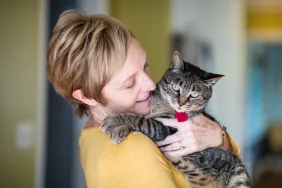At 10:45 this particular Saturday morning, Louisville, Kentucky’s Animal Care Society (ACS) is still fifteen minutes from opening to the public, but pairs of humans and canines stroll in and out the front door in a steady stream of traffic. The shelter’s dogs get their first walks of the day as administrators prepare for the weekend’s potential adopters. I’d been told that ACS is a “small organization,” but the volunteer participation already impresses me.
Bunny Zeller is the shelter’s assistant director and she shows me around the facilities. One of our first stops is the “new moms” area and I’m allowed to peek in at what appears to be a Maltese mix tending to her week-old pups. (I imagine that glimpses like this are worth the volunteer hours alone.)
“We keep them here where it’s nice and quiet,” Zeller tells me, beaming as if she’s responsible for the impossibly sweet scene we’re witnessing. It dawns on me that in a way, she is responsible.
Abandoned, surrendered, but not forgotten
The shelter sits at the edge of town with a large, enclosed outdoor area just behind the kennels. Several dogs are in the yard, enjoying play group, and I’m greeted with spirited wagging and muddy paws. Zeller points out the Pit Bull mix, a gorgeous black and white 50-pounder, romping around delightedly with two Lab mixes.
“That poor guy was abandoned in a grocery cart outside a supermarket late one night,” she tells me. “Luckily he was found before he could become too traumatized.”
Click to listen to the Road to Rescue interview with ACS assistant director Bunny Zeller on Animal Radio Network.
Though she sees her share of abuse and neglect cases, Zeller says that most of the animals they take in are “owner surrenders” — that is, pets whose families (for any number of reasons) must now give them up. Zeller explains that the recent spate of housing foreclosures have left Louisville shelters maxed out, as families move into non pet-friendly apartments, or simply can’t afford to have animals any longer.
With ACS the only no-kill facility in town, it’s not surprising they’ve been inundated with requests from people desperate to find a safe place for their dog or cat.
“It’s hard enough to give up an animal who’s been part of your family, and no one wants to think their beloved pet might be put down if they’re surrendered to a shelter,” Zeller says. “But unfortunately that’s what happens when you have a limited amount of space and a lot of homeless animals.”
Smart sheltering
Near the end of the shelter tour, Zeller leads me into a storage filled with gift baskets of varying sizes and contents. “We just finished our last big fundraiser and we’re already gearing up for next quarter’s,” she explains, describing how she personally puts together many of the creations before us.
I gather it’s not the first time ACS has staged this sort of auction, and Zeller–also the primary fundraiser for the shelter–assures me it’s not. “It’s not a great feeling to have to turn away families and pets, so our goal is to continue raising money, continue expanding our resources.”
I tell Zeller that I’m not worried about her reaching her goal. And that is a heck of a nice feeling to have walking out of an animal shelter.
– by Leslie Smith









